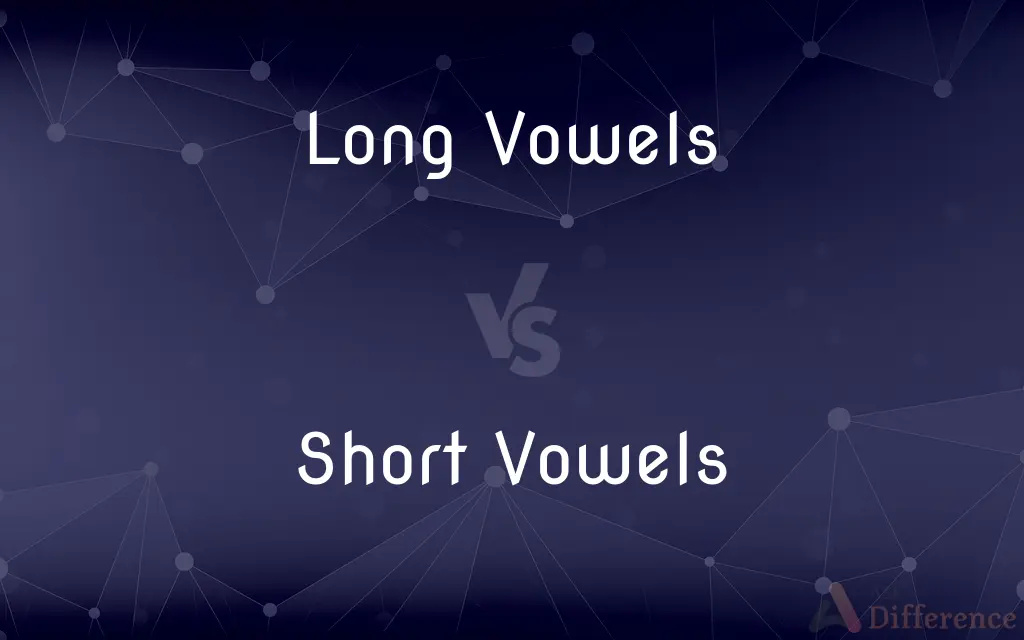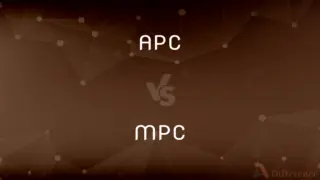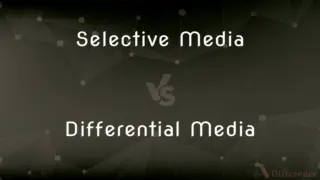Long Vowels vs. Short Vowels — What's the Difference?
Edited by Tayyaba Rehman — By Fiza Rafique — Published on December 28, 2023
Long Vowels sound like the letter's name, e.g., "a" in "cake". Short Vowels don't, e.g., "a" in "cat".

Difference Between Long Vowels and Short Vowels
Table of Contents
ADVERTISEMENT
Key Differences
Long Vowels and Short Vowels are fundamental phonetic concepts in the English language, helping determine pronunciation and meaning of words. A Long Vowel is one where the sound of the vowel is similar to the name of the vowel itself. For instance, in the word 'meet', the 'ee' sound is pronounced the same way as the name of the letter 'e'. On the other hand, a Short Vowel sound does not sound like the vowel's name. In the word 'met', the letter 'e' does not carry the same pronunciation as its name but has a shorter sound.
In many cases, Long Vowels are represented in spelling by two vowels together, like 'ea' in 'beach' or 'oa' in 'boat'. However, it's not a strict rule, as there are many exceptions in the English language. Short Vowels, meanwhile, are typically surrounded by consonants in words. For example, the 'a' in 'bat' or the 'i' in 'sit' are short vowel sounds.
It's essential to recognize the distinction between Long Vowels and Short Vowels as they can lead to differences in word meanings. For instance, the difference in vowel length changes the meaning in pairs like "mat" (Short Vowel) and "mate" (Long Vowel).
To summarize, while Long Vowels and Short Vowels both pertain to the pronunciation of vowel sounds in English, they differ in how closely the spoken sound resembles the name of the vowel letter. Recognizing these differences is crucial for both reading and pronunciation.
Comparison Chart
Sound Resemblance
Sounds like the vowel's name
Doesn't sound like the vowel's name
ADVERTISEMENT
Spelling Indicator
Often (but not always) represented by two vowels
Typically surrounded by consonants
Example Words
Cake, meet, boat
Cat, met, bit
Effect on Meaning
Can change word meaning with length alteration
Can change word meaning with length alteration
Function
Helps in differentiating word pronunciation & meaning
Helps in differentiating word pronunciation & meaning
Compare with Definitions
Long Vowels
Vowel sounds often represented by double vowel letters.
The 'ee' in tree is a Long Vowel sound.
Short Vowels
Quick, brief vowel pronunciations.
The 'e' in bed is a Short Vowel sound.
Long Vowels
Extended sounds often found in open syllables.
The 'i' in bike demonstrates a Long Vowel sound.
Short Vowels
Pronunciations typically surrounded by consonants.
The 'u' in duck showcases a Short Vowel sound.
Long Vowels
Vowel sounds that match the spoken name of the vowel.
The 'a' in bake has a Long Vowel sound.
Short Vowels
Vowel sounds not matching the vowel's name.
The 'a' in cat has a Short Vowel sound.
Long Vowels
Pronunciations echoing the letter's actual name.
The 'o' in code exemplifies a Long Vowel pronunciation.
Short Vowels
Sounds often found in closed syllables.
The 'i' in hit has a Short Vowel sound.
Long Vowels
Extended vowel sounds resembling vowel names.
The 'u' in cube is pronounced with a Long Vowel sound.
Short Vowels
Vowel sounds distinct from the letter's name.
The 'o' in pot is a Short Vowel.
Common Curiosities
What is a Long Vowel?
A long vowel is a vowel sound that is pronounced the same way as the name of the letter itself.
Are long vowels always indicated in spelling?
Not always. While some patterns exist, English spelling doesn't consistently indicate when a vowel is long.
Is there a difference between a long vowel and a double vowel?
Yes, while a long vowel refers to its pronunciation, a double vowel typically refers to two vowel letters next to each other in spelling (e.g., "book"), which isn't always pronounced as a long vowel.
Can you give examples of Long Vowels?
Sure! Examples include the "a" in "cake," the "e" in "tree," the "i" in "fine," the "o" in "note," and the "u" in "mule."
Do all languages have long vowels?
No, the concept of long and short vowels is primarily used in English phonetics. Other languages might have different vowel length distinctions or none at all.
Are diphthongs considered long vowels?
Diphthongs are complex vowel sounds where you glide from one vowel sound to another within a single syllable. While they can be similar in length to long vowels, they're not the same.
Are short vowels easier to pronounce?
Not necessarily. Whether a vowel is long or short, its ease of pronunciation depends on the speaker's native language and familiarity with English sounds.
How does accent or dialect affect long vowels?
Different accents or dialects can have variations in vowel pronunciation, which can affect what might be considered a "long vowel" in one accent versus another.
What is a Short Vowel?
A short vowel is a vowel sound that does not sound the same as its letter's name and is typically shorter than the corresponding long vowel sound.
How can I recognize a long vowel in a word?
Some common patterns exist, like the silent-e rule, where a word like "mate" has a long "a" due to the "e" at the end. But exceptions abound in English.
Why are they called "long"?
The term "long" doesn't necessarily refer to the duration of the sound but rather differentiates them from "short" vowel sounds in terms of pronunciation.
Can a single letter have both long and short sounds?
Yes, for example, the letter "a" can be short as in "cat" or long as in "cake."
Do short vowels follow a pattern in spelling?
There are some patterns, like the CVC (consonant-vowel-consonant) pattern often indicating short vowels, but English has many exceptions.
Do long vowels influence English rhythm and meter?
Yes, in poetry and prose, the use and placement of long vowels can influence the rhythm, meter, and overall sound.
Can you give examples of Short Vowels?
Of course! Examples include the "a" in "cat," the "e" in "bed," the "i" in "sit," the "o" in "top," and the "u" in "cup."
Share Your Discovery

Previous Comparison
APC vs. MPC
Next Comparison
Selective Media vs. Differential MediaAuthor Spotlight
Written by
Fiza RafiqueFiza Rafique is a skilled content writer at AskDifference.com, where she meticulously refines and enhances written pieces. Drawing from her vast editorial expertise, Fiza ensures clarity, accuracy, and precision in every article. Passionate about language, she continually seeks to elevate the quality of content for readers worldwide.
Edited by
Tayyaba RehmanTayyaba Rehman is a distinguished writer, currently serving as a primary contributor to askdifference.com. As a researcher in semantics and etymology, Tayyaba's passion for the complexity of languages and their distinctions has found a perfect home on the platform. Tayyaba delves into the intricacies of language, distinguishing between commonly confused words and phrases, thereby providing clarity for readers worldwide.













































